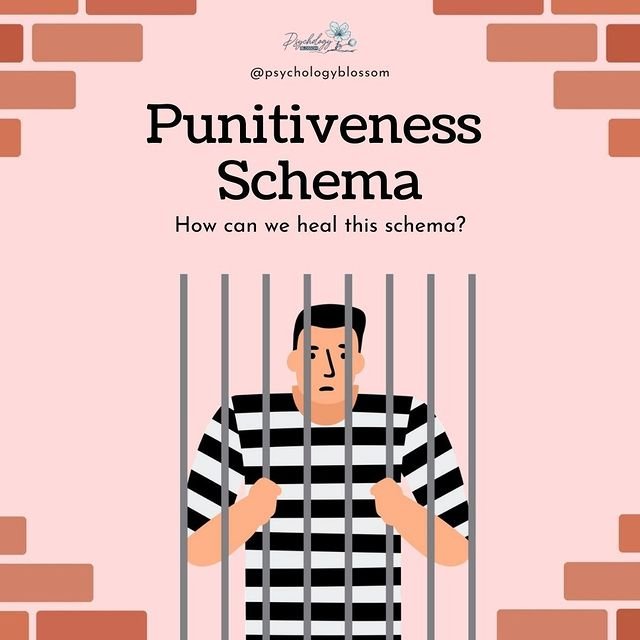Punitiveness Schema: Breaking Free from Harsh Self-Criticism
Punitiveness Schemas cause individuals to have an excessive expectation that people should be punished for their mistakes. This desire to punish does not stop with others — it also turns inward. People with a Punitiveness Schema find it very difficult to forgive both others and themselves. They often experience intense guilt and shame when they feel they have done something wrong, which can make daily life overwhelming. These individuals may constantly replay situations in their minds, thinking about how they should have acted differently, or berating themselves for even minor errors. Over time, this cycle of harsh judgment erodes self-esteem and impedes emotional growth.
With this schema, individuals strive to create a world that is black and white: predictable, structured, and controlled. It is natural to desire fairness and justice, but for those with a Punitiveness Schema, there is little room for the shades of grey that make up human imperfection. They often lack the ability to empathize with others and to understand why people make certain mistakes. As a result, they may feel isolated or misunderstood, and their relationships often suffer. Such individuals tend to be angry, impatient, or easily irritated, which leads them to withdraw from others, creating a cycle of loneliness and frustration.
Signs and Symptoms of a Punitiveness Schema
Punitiveness manifests in a range of behaviours and thought patterns that can affect personal wellbeing, work life, and relationships. Common signs include:
- Punishment gives you a sense of relief or satisfaction.
- Seeing people go unpunished feels deeply uncomfortable.
- A strong tendency to categorize the world into “right” and “wrong.”
- Believing that explanations for behaviour are irrelevant or unimportant.
- Finding it hard to forgive and forget, often holding grudges for years.
- Being critical, harsh, and judgmental toward others.
- Intolerance of mistakes and impatience with others’ flaws.
- Being overly self-critical, often to the point of constant guilt and shame.
These symptoms can manifest in subtle ways. For example, a person with this schema might feel disproportionate anger when someone cuts in line at a store, believing that small violations deserve significant consequences. At work, they might harshly judge colleagues who make minor mistakes, while holding themselves to impossibly high standards that foster burnout. In personal relationships, they may struggle with forgiveness, which creates distance and conflict.
Development
Schemas typically develop during childhood, shaped by experiences with caregivers, family dynamics, and the environment. If, as a child, you experienced excessive punishment from your parents — whether verbal reprimands, harsh criticism, or physical punishment — you may be at risk of developing a Punitiveness Schema. Emotional abuse, neglect, or living in an environment where mistakes were met with anger or violence also contribute to the schema’s formation.
Children naturally internalize their caregivers’ behaviour. When punished harshly, they may learn to associate mistakes with shame and worthlessness. Instead of understanding that errors are part of learning, they develop a belief that mistakes make them “bad.” This thinking pattern often persists into adulthood, shaping self-perception and interactions with others.
In adulthood, Punitiveness Schema might manifest in aggressive or rigid ways. A person may feel a heavy burden to uphold moral order or to enforce fairness, even when the situation does not require it. They may place themselves in the role of “judge,” holding others accountable to unrealistic standards, or turning their inner critic against themselves when they fall short. Over time, this leads to a cycle of frustration, anger, guilt, and isolation.
The Impact of a Punitiveness Schema
The consequences of living with a Punitiveness Schema can be profound. Emotionally, it fosters shame, guilt, and dissatisfaction. Relationally, it creates distance, as friends, partners, or family members may feel unfairly criticized or unable to live up to impossible standards. Professionally, individuals may excel in structured environments due to their high expectations but may struggle with teamwork, adaptability, or creative problem-solving.
Physically, the stress associated with constant judgment and criticism can manifest as tension, headaches, insomnia, or even long-term health issues. In some cases, punitiveness is linked to perfectionism, obsessive behaviours, and burnout, making it difficult to maintain a balanced lifestyle.
Treatment
Schema Therapy is the main treatment for Punitiveness Schema and many others. Because schemas operate largely outside of conscious awareness, therapy focuses on bringing these patterns to light and challenging their influence. Clients work with a therapist to explore the origins of their punitive thinking, identify triggers, and develop healthier responses.
Through Schema Therapy, individuals can cultivate empathy and patience, learning to embrace imperfection both in themselves and others. This involves building new cognitive frameworks that allow for forgiveness and compassion. Over time, clients learn to replace harsh inner criticism with self-acceptance, reducing feelings of shame and guilt. Techniques such as imagery rescripting, cognitive restructuring, and role play are often used to reframe early life experiences and soften punitive patterns.
Other therapeutic approaches, such as mindfulness-based therapy or acceptance and commitment therapy (ACT), may also be integrated. These approaches emphasize present-moment awareness, helping individuals detach from rigid thought patterns and accept human imperfection as a natural part of life.
If you’re seeking Schema Therapy in Singapore or have any inquiries, please don’t hesitate to reach out to us. We’re here to help.
We recommend This Video to those who wants to learn more about Punitiveness Schema.
About Us
We are a team comprising psychologists based in Singapore endeavouring our best to prioritise our clients’ needs. When you embark on this journey with us, we take a collaborative approach where you and your psychologist work closely together, and listen to what you have to say — No judgments, and in a safe space. Meet our Team
Quick Links
Contact Us
150 Cecil Street #07-02 S069543
Opening Hours
Monday to Friday: 8am to 6pm
Saturday: 8am to 2pm
Sunday: 10am to 2pm (Online only)
Admin Hours
Monday to Friday: 8am to 5.30pm
Saturday: 8am to 2pm
© Copyright 2023 – Psychology Blossom | Privacy Policy | Terms
